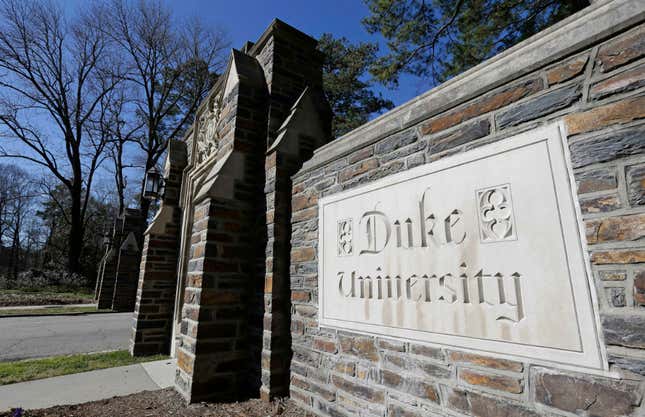
I was going to begin this write-up talking about Rush Limbaugh. I was going to talk about pre-presidency George W. Bush. I was going to mention the nearly endless list of renowned politicians, actors and recording artists who have or are currently battling drug addiction.
Then I realized it doesn’t matter because rich white people have always been able to engage in the same frowned-upon activities as underprivileged Black people without even a fraction of the stigma being attached to them. Black drug addicts don’t matter.
George Floyd was a drug addict, and for whatever reason, a lot of people (mostly white and conservative) seem to think that matters. They think it matters so much that they won’t pass on an opportunity to bring it up during any and all discussions on Floyd and police brutality or if any sign of empathy for Floyd is being displayed—which brings us to the situation at Duke University.
The Washington Post reports that school officials are investigating an incident in which some coward and likely racist taped a piece of paper to a photo of Floyd that was posted on a Black History Month bulletin board. What was on the piece of paper? Floyd’s toxicology report from his autopsy, printed along with the statement: “Mix of drugs presents in difficulty breathing! Overdose? Good man? Use of fake currency is a felony!”
Clearly, some bigot had a lot of time on their hands.
“I was really incredulous that someone would actually go to the effort of finding the report in its original form,” Duke freshman Matt Mohn, who discovered the note in his dorm last Saturday, told the Post. “It seemed almost more audacious than just writing a slur or putting up something more overtly hateful.”
From the Post:
Now, school administrators and campus police are investigating the incident as a possible violation of the school’s anti-harassment and discrimination policy, school administrators announced in an email to students this week. The school referred to the note as an “anonymous act of bias.”
“If Duke students are found to be responsible for this act, the Office of Conduct and Community Standards (OSCCS) will issue sanctions to the responsible student,” Associate Vice President for Student Affairs and Dean of Students John Blackshear and OSCCS Senior Associate Dean and Director Jeanna McCullers said in the email.
Mohn found the note on Saturday inside a dorm that has a hallway bulletin board commemorating Black victims of police violence, including Philando Castile and Breonna Taylor. Just like Floyd’s post, each picture was accompanied by a summary of the incident related to their death.
Mohn told the Post that the bulletin board was put up in February, but this is the first time it had been vandalized.
“The entire message was that he was responsible for his own demise,” Mohn said. “That because he tested positive for drugs or because he had one $20 bill that was counterfeit that he deserved to be executed. I think it was racist in a way that absolved the White police officer that had been kneeling on him.”
Michael Manns, a Black freshman who lives down the hall from where the white nonsense was posted, told CNN that he felt “terrified” by the act.
“I was honestly terrified; I remember shaking in that moment,” Manns said. “That happened right down the hall from where I sleep, from where I’m supposed to be safe. The thought that it could be someone I’ve lived with all these months really terrified me.”
Apathy toward police violence against Black people certainly can be terrifying, but it’s not surprising.
Breonna Taylor didn’t even need to be a drug addict for someone to feel the need to smash a bust sculpted in her image, or to climb a billboard displaying her image and deface it with red paint resembling a bullet wound over her forehead.
It’s also not the first, second, third or even the fourth time a display of Floyd has been vandalized—you probably couldn’t count how many times it has happened. So, why does the incident at Duke hit differently?
Maybe it’s because the judge in former officer Derek Chauvin’s murder case recently ruled that a jury can see evidence from a past drug-related Floyd arrest. Maybe it’s because a grand jury declined to charge the officers who were involved in Daniel Prude’s death—likely because Prude was viewed then just as he was when he was in custody: He was just another Black drug addict.
The fact is, a lot of people view drug addiction as a reason to devalue the very lives of fellow human beings—unless they’re rich, or white, or famous...or just not George Floyd.

